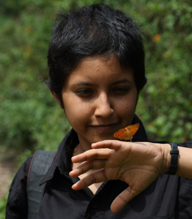
I grew up in various cities in India as my father moved for his work. My parents encouraged science and scholarship, so it was easy to decide early on that I wanted to do research in biology. I had just learnt basic Mendelian genetics in high school, and I thought DNA was so very cool! Although I didn't particularly care for microbes, I did my Bachelor's degree in Microbiology because the department encouraged undergraduates to potter around in the lab and test their ideas. This was practically unheard of at that point in India, so it was a great opportunity to learn as an undergraduate.
In my college in Pune I found friends who shared my enthusiasm for libraries, and we would sit around for hours talking science and ideas. I was also lucky that Prof. Milind Watve, the department head, organized informal science discussions where I discovered the fun in ecology and evolutionary biology. I used much of my time outside college to get research experience in the lab or field, or to just wander the hills in and around the city looking at plants and insects. For my first serious summer project I observed individual interactions and mutilation behavior during gamergate establishment in Diacamma ceylonense ants in Prof. Raghavendra Gadagkar's lab. This was a lot of fun, even though these big ants are not kind with their stings and bites. Memorable field experiences included mapping invasive weeds in the Mudumalai wildlife sanctuary, and later testing some of my ideas on butterfly mudpuddling behavior in the nearby Biligiri Hills. Along the way, enriching adventures - such as an exciting (and luckily brief) chase by a mamma elephant - reinforced my love of biology.
Halfway through my subsequent Master's coursework, I joined the PhD program at the University of Texas at Austin. In Dr. Daniel Bolnick's lab, I used the flour beetle Tribolium castaneum to show that intraspecific genetic variation can stabilize population dynamics, prevent extinction, and enhance adaptation to novel resources. I like doing experiments where organisms evolve; and it is a bonus if I can watch their ecology and behavior change during the process. For my postdoctoral work, I wanted to continue with experimental evolution but also explore a new set of ideas. So, I am testing the fitness effects of synonymous mutations (i.e. codon changes) in Methylobacterium extorquens, working with Dr. Christopher Marx at Harvard University. Apart from learning many genetic tools, this work has given me a new perspective into the mechanistic details of how evolution works at the molecular and physiological level.
You can read more about my past and current research on my website. Although I have switched across study organisms and research foci, I retain my interest in broader ecological and evolutionary questions. Being part of the American Society of Naturalists makes this easier, since the large diversity of research conducted and published by ASN members means that I can find colleagues interested in many of my research ideas in one place.
Away from science, I love to cook, and to hike and swim. I recently tried rock climbing with some friends, and really liked that too. On the quiet side of things I like to walk a lot, especially if I can watch the sun rise before life wakes up. I enjoy poetry, and dabble a little in pottery, fused glass, and random other crafts. Someday, I hope to learn to speak and understand a few more languages so I can read their poetry too.